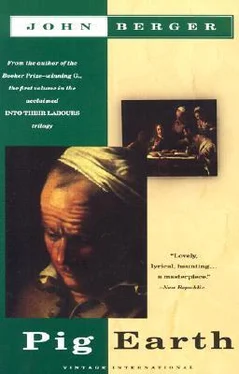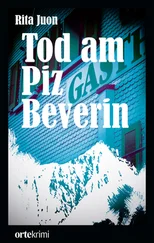In protest against the double abandonment by blood and brain, the cow’s body twists violently and its hind legs lunge into the air. It is surprising that a large animal dies as quickly as a small one.
The mother lets go of the foreleg — as if the pulse was now too weak to count — and it falls limply against the body. The son begins to cut the hide away around the horns. The son learnt his speed from his father, but now the old man’s actions are slow. Ponderously at the back of the slaughter-house the father is splitting a horse in two.
Between mother and son there is a complicity. They time their work together without a word. Occasionally they glance at each other, without smiling but with comprehension. She fetches a four-wheeled trolley, like an elongated, very large open-work pram. He slits each hind leg with a single stroke of his tiny knife and inserts the hooks. She presses the button to start the electric hoist. The cow’s carcass is lifted above them both and then lowered on its back into the pram. Together they push the pram forward.
They work like tailors. Beneath the hide, the skin is white. They open the hide from neck to tail so that it becomes an unbuttoned coat.
The peasant to whom the cow belongs comes over to the pram to point out why she had to be slaughtered; two of her teats were decomposing and she was almost impossible to milk. He picks up a teat in his hand. It is as warm as in the stable when he milked her. The mother and son listen to him, nod, but do not reply and do not stop working.
The son severs and twists off the four hooves and throws them into a wheelbarrow. The mother removes the udder. Then, through the cut hide, the son axes the breast bone. This is similar to the last axing of a tree before it falls, for from that moment onwards, the cow, no longer an animal, is transformed into meat, just as the tree is transformed into timber.
The father leaves his horse and shuffles across the abattoir to go outside and pee. This he does three or four times each morning. When he walks for some other purpose, he walks more briskly. Yet it is hard to say whether he shuffles now because of the pressure on his bladder, or to remind his much younger wife that, whilst his old age may be pathetic, his authority is remorseless.
Expressionless the wife watches him until he reaches the door. Then she turns solemnly back to the meat and starts to wash it down and then to dab it dry with a cloth. The carcass surrounds her but almost all tension has gone. She might be arranging a larder. Except that the fibres of meat are still quivering from the shock of the slaughter, exactly as the skin of a cow’s neck does in summer to dislodge the flies.
The son splits the two sides of beef with perfect symmetry. They are now sides of meat such as the hungry have dreamt of for hundreds of thousands of years. The mother pushes them along the rail system to the scales. They weigh together two hundred and fifty-seven kilograms.
The peasant checks the reading on the meter. He has agreed to nine francs a kilo. He gets nothing for the tongue, the liver, the hooves, the head, the offal. The parts which are sold to the urban poor, the rural poor receive no payment for. Nor does he get paid for the hide.
At home, in the stable, the place which the slaughtered cow occupied is empty. He puts one of the young heifers there. By next summer she will have come to remember it, so that each evening and morning, when she is fetched in from the fields for milking, she will know which place in the stable is hers.
When she could no longer
prepare mash for the chickens
or peel potatoes
for the soup
she lost her appetite
even for bread
and scarcely ate
He was painting himself
black on the branches
to watch the crows
who no longer flew high
but kept to the earth
Smaller than the stove
she sat by the window
where outside the leeks grow
By the wood stack
— the hillsides of brushwood
she had carried on her back—
he crouched and became
the chopping block
Her daughter-in-law
fed the chickens
put wood in the stove
At night he reclined on each side
of the black fire
burning her bed
What she asked him was his opposite?
Milk he answered with appetite
Lining the kitchen
family and neighbours followed
her fight for breath
High up the mountain
he pissed on
snow and ice
to melt the stream
She found it easier if
she laid her head
on the arm of the chair
His urine was the shape
of an icicle
and as colourless
In her hand
she held a handkerchief
to dab her mouth
when it needed wiping
On his black mirror
there was never breath
The guests as they left
kissed the crown of her head
and she knew them
by their voices
He trundled out a barrow
overturned it
on the frozen dungheap
its two legs still warm
The seventy-third anniversary
of her marriage night
she spent
huddled in the kitchen
from time to time calling her son
she called him by his surname
who rocked on his slippered feet
like a bear
One mistake you made
Death did not joke like a drunk
You should not have grown old
I was not a thief she replied
Dead she looked as tall
laid out on her bed
in dress and boots
as when a bride
but her right shoulder
was lower than the left
on account of all
she had carried
At her funeral
the village saw the soft snow
bury her
before the gravedigger
HUBERT LED THE CALF into the lorry and unbuckled her collar. Later he would hang it on a nail in the hayloft, ready for the next calf. He was a large man, but very meticulous. The travelling buyer from the plant asked him his price. When Hubert did not wish to talk about something, he had the habit of making speech-like noises which in fact did not form words, but were convincing and sounded like another patois. If Marie asked him where he had been working, and his thoughts were still far away, he would answer in this polite unintelligible language. He did this now to force the buyer to name his price for the calf. The price did not, as it does for most livestock, go by weight but by look. Folding the bank notes, Hubert made a little square packet of them, and thrust it into the depths of his trouser pocket. Then both men went up to the kitchen to drink a glass of gnôle.
Whenever Hubert had passed the calf in the stable, she backed away abruptly and clumsily. She was attached close to the wall by a chain and a collar. The largest movement she could make was to lunge with her head at the bottom of the wall and kick her hind legs in the air. The lower part of the wall was brown from the shit of the other calves who had been attached to the same ring in the wall.
She did not have a name, because Marie did not give names to calves they were not going to keep. When the calf was ten days old, she had been timid. This was at the end of February. The streams from the rockface were as idle and transparent as icicles. The calf slept on the wood put down on the stone floor to keep her warm. She stood waiting to be fed. She learnt to kick. She came to recognise the pressure of the collar round her neck when she moved a certain distance away from the wall. She distinguished between near and far. An approach towards her from far to near became a threat.
When she was five days old, Hubert tied a child’s plastic bucket round her muzzle to prevent her trying to eat the straw of her bedding. Only a little daylight entered the stable. Perhaps the half-light encourages the great winter patience of the cows. For six months they face the same beams, the same wooden struts of the same manger. Between their four stomachs, they fill their time with eating, munching, re-munching, licking, slowly lowering and raising their heads. They never — not even during the night — relapse into the non-being of the reptile or sleeping bat. If they did, they would produce no milk.
Читать дальше












